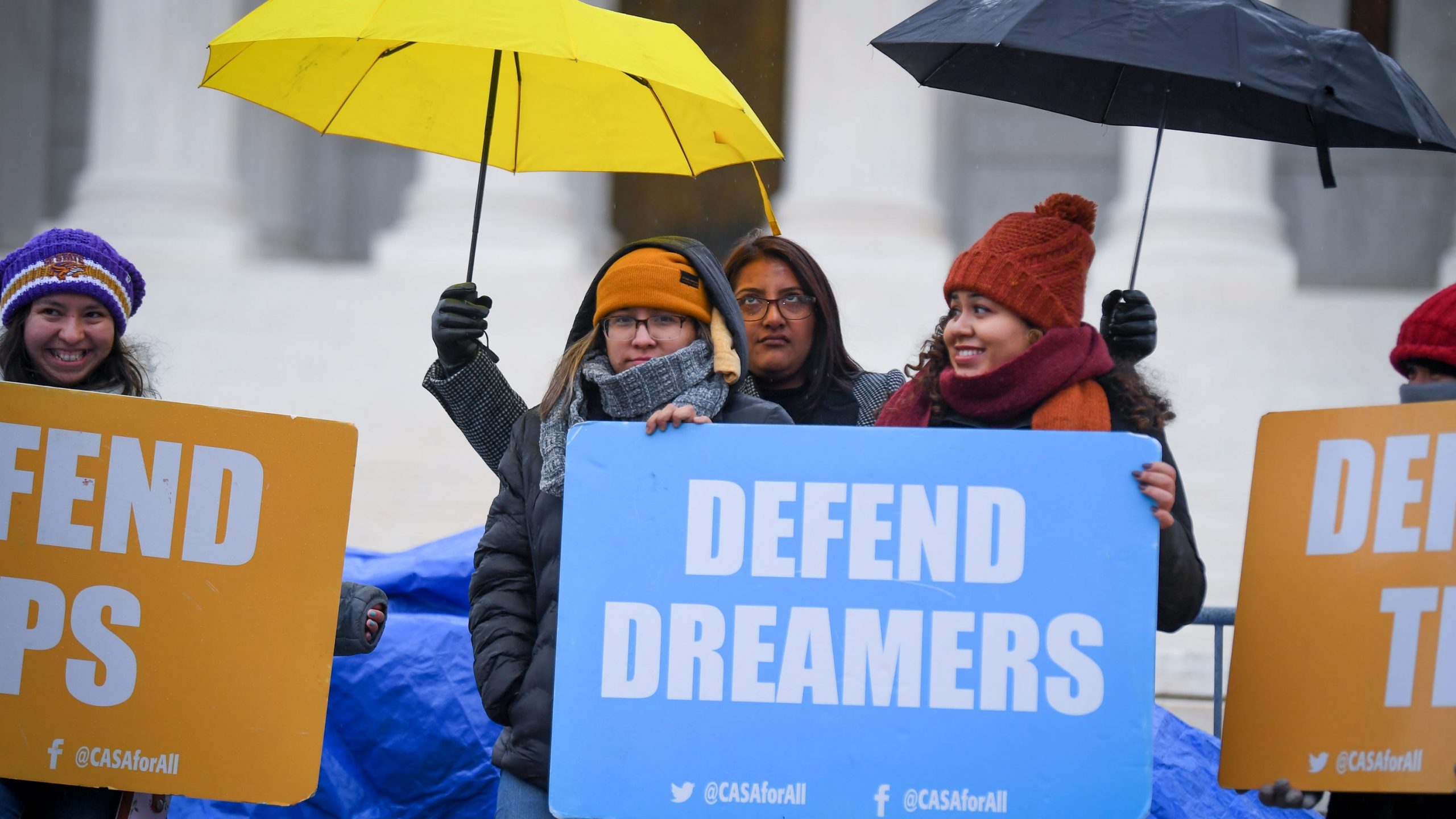CLOSE![]()
USA TODAY spoke with four DACA recipients in Austin, Texas about the Supreme Court hearing the case that will decide the fate of the program.
USA TODAY
WASHINGTON – A deeply divideThe Supreme Court blocked the Trump administration Thursday from ending a popular program that allows nearly 650,000 young, undocumented immigrants to live and work in the United States without fear of deportation.
Chief Justice John Roberts, who wrote the majority opinion, called the Department of Homeland Security’s action “arbitrary and capricious” and therefore unlawful. The ruling was 5-4, with the court’s four liberal justices agreeing and the four more conservative justices in dissent.
“We do not decide whether DACA or its rescission are sound policies,” Roberts said. “We address only whether the agency complied with the procedural requirement that it provide a reasoned explanation for its action. Here the agency failed to consider the conspicuous issues of whether to retain forbearance and what if anything to do about the hardship to DACA recipients.”
It was a similar outcome to last year’s effort by the Trump administration to add a question on citizenship to the 2020 census. In that case as well, Roberts joined the four liberal justices in ruling that the administration had not justified its action.
It also was the second major ruling this week in which the conservative court dealt a setback to the Trump administration. On Monday, it ruled 6-3 in an opinion by Associate Justice Neil Gorsuch that the LGBTQ community is protected under a federal law banning sex discrimination in the workplace.
More: Ruling on LGBTQ rights reveals precarious nature of Supreme Court’s conservative majority
Roberts rejected the argument that the winding down of the program was a violation of the Constitution’s Equal Protection Clause because of animus against Hispanics. Had the court ruled that the equal protection principle had been violated, DACA would have been more fully protected from a new attack. The court’s conservatives agreed with the conclusion that there was no racial animus; only Associate Justice Sonia Sotomayor dissented from it.
Associate Justice Clarence Thomas wrote the main dissent, in which he said the DACA program was unlawful from the moment President Barack Obama created it in 2012. Gorsuch and Associate Justice Samuel Alito agreed.
“The majority does not even attempt to explain why a court has the authority to scrutinize an agency’s policy reasons for rescinding an unlawful program under the arbitrary and capricious microscope,” Thomas said. “The decision to countermand an unlawful agency action is clearly reasonable. So long as the agency’s determination of illegality is sound, our review should be at an end.”
Trump later tweeted a quote from Thomas’ dissent in which the court’s most conservative justice called the ruling “an effort to avoid a politically controversial but legally correct decision.”
These horrible & politically charged decisions coming out of the Supreme Court are shotgun blasts into the face of people that are proud to call themselves Republicans or Conservatives. We need more Justices or we will lose our 2nd. Amendment & everything else. Vote Trump 2020!
— Donald J. Trump (@realDonaldTrump) June 18, 2020
Associate Justice Brett Kavanaugh wrote separately in dissent and decried the Roberts’ ruling for continuing the uncertainty surrounding the program’s legal status.
“That uncertainty is a result of Congress’s inability thus far to agree on legislation, which in turn has forced successive administrations to improvise, thereby triggering many rounds of relentless litigation with the prospect of more litigation to come,” Kavanaugh said.
Thousands of DACA recipients are serving on the front lines in the coronavirus pandemic as doctors, nurses, paramedics and other health care workers. That had prompted immigration rights groups to file new court papers urging the justices to leave the program alone.
Before Thursday, nearly every federal judge to hear the dispute has sided with the so-called Dreamers, leaving the program intact nationwide. Some observers believed the Supreme Court’s decision last June to hear the case signaled a potential win for the White House. Instead, the high court delivered another surprise to the White House, the second this week.
The question before the justices in November was not whether the Trump administration can wind down the program, which is undisputed. Rather, they were asked to decide if the administration’s initial reason for doing so – that DACA was illegal from the start – was accurate and sufficient, and whether officials followed the Administrative Procedure Act in curtailing it.
Roberts was presumed to be the deciding vote all along, as he was last year when he voted with the court’s four liberal justices to strike down the Trump administration’s effort to add a citizenship question to the 2020 census.
Obama created the program eight years ago after negotiations with Congress to create a path to citizenship for the young immigrants faltered. Several years later, he sought to extend similar protections to more than 4 million undocumented parents of citizens or lawful permanent residents, but that was shot down by federal courts.
Texas then threatened to sue over DACA if the Trump administration didn’t end it. When the Department of Homeland Security did so, lawsuits were filed from California to New York and several places in between, and two federal judges blocked the action nationwide.
The U.S. Court of Appeals for the 9th Circuit, based in California and a perpetual thorn in Trump’s side, ridiculed the effort to deport “blameless and economically productive young people with clean criminal records.”
To qualify every two years for DACA, recipients generally must be students, high school graduates or be enrolled or honorably discharged from the military. They cannot have been convicted of a felony, significant misdemeanor or more than three lesser crimes.
The threat of losing their protected status had prompted hundreds of DACA recipients to march, ride or fly to Washington for November’s oral argument and stage demonstrations outside the court.
Earlier: Activists, DACA recipients gather as Supreme Court hears case
Nearly three dozen legal briefs were submitted on their side by groups representing big business, educators, religious institutions, labor unions, law enforcement and national security groups, along with immigration and civil rights organizations.
Autoplay
Show Thumbnails
Show Captions
Read or Share this story: https://www.usatoday.com/story/news/politics/2020/06/18/daca-supreme-court-donald-trump-end-immigration-program/4458220002/







… [Trackback]
[…] Find More Information here on that Topic: famousreporters.com/supreme-court-ruling-upholds-daca-program-for-young-undocumented-immigrants/ […]
… [Trackback]
[…] Information to that Topic: famousreporters.com/supreme-court-ruling-upholds-daca-program-for-young-undocumented-immigrants/ […]
… [Trackback]
[…] There you will find 26422 more Information on that Topic: famousreporters.com/supreme-court-ruling-upholds-daca-program-for-young-undocumented-immigrants/ […]
… [Trackback]
[…] Here you can find 99645 additional Info on that Topic: famousreporters.com/supreme-court-ruling-upholds-daca-program-for-young-undocumented-immigrants/ […]
… [Trackback]
[…] Read More Information here to that Topic: famousreporters.com/supreme-court-ruling-upholds-daca-program-for-young-undocumented-immigrants/ […]
… [Trackback]
[…] Read More to that Topic: famousreporters.com/supreme-court-ruling-upholds-daca-program-for-young-undocumented-immigrants/ […]